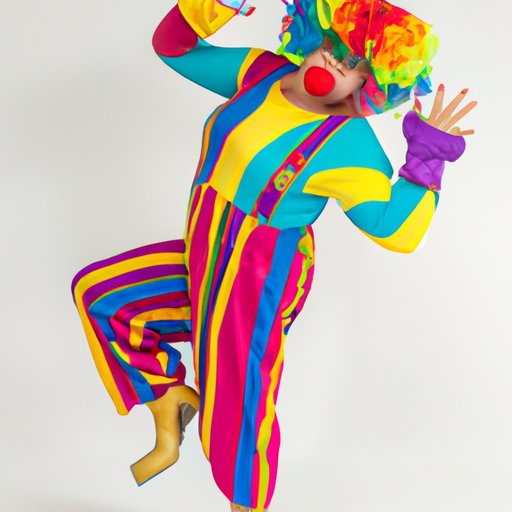Introduction
Clowns have been around for centuries and are still popular entertainment today. From circuses to birthday parties, clowns bring joy and laughter wherever they go. If you’re interested in becoming a professional clown, there are several steps you should take to ensure success. This article will cover the basics of clowning and provide tips on how to develop a unique clown persona, practice your skills, join professional organizations, and market yourself.
Definition of Clowning
Clowning is more than just wearing funny clothes and putting on makeup. It is an art form that requires skill, creativity, and imagination. Clowns use physical comedy, improvisation, and storytelling to entertain and engage their audiences. They also create unique characters and personas to stand out from other performers.
Overview of the History of Clowns
Clowns have been around for thousands of years in various forms. Ancient Greeks and Romans used clowns to parody politics and religion. In the 16th century, clowns were featured in traveling performances, performing physical comedy and acrobatics. By the 19th century, clowns had become a staple of circuses and vaudeville shows. Today, clowns can be found at birthday parties, corporate events, and other special occasions.

Developing a Unique Clown Persona
One of the most important aspects of being a successful clown is developing a unique persona. Your clown character should be distinct and memorable so that people will remember you. Here are some tips on how to create a unique clown persona.
Research Popular Clown Types
Before you create your clown persona, it’s important to research different types of clowns. Popular clown types include auguste, whiteface, tramp, character, and hobo clowns. Each type has its own style of costume and makeup, as well as its own set of skills and abilities. Researching different clown types will help you determine which type best fits your personality and skillset.
Reflect on Your Own Personality and Skillset
Once you’ve researched popular clown types, it’s time to reflect on your own personality and skillset. Consider your strengths and weaknesses, as well as what makes you unique. Ask yourself questions such as “What do I like to do?” and “What kind of character would I like to portray?” Answering these questions will help you create a clown persona that is unique to you.
Design a Costume and Makeup Look
Now that you’ve determined your clown type and persona, it’s time to design a costume and makeup look. Think about colors and patterns that fit your character. You may also want to consider investing in props and accessories that will make your character stand out. Be sure to practice your makeup and costume before your first performance so that you can perfect your look.
Practicing Your Clowning Skills
Once you’ve developed your clown persona, it’s time to practice your clowning skills. Here are some tips on how to get started.
Utilizing Physical Comedy
Physical comedy is an important part of clowning. Practice different movements and facial expressions to see what works best for you. You can also experiment with props, such as juggling balls or hula hoops. The key is to find movements and routines that are unique to your character and will engage your audience.
Brainstorming Different Acts
Once you’ve mastered physical comedy, it’s time to brainstorm different acts. Think about what kinds of jokes and routines you could do. You may also want to incorporate music or magic into your act. Come up with a few different acts that you can perform depending on the occasion.
Rehearsing with Friends and Family
Once you’ve created your acts, it’s time to rehearse them. Ask friends and family to watch you perform and give feedback. Rehearsing will help you refine your techniques and determine which jokes and routines work best for your audience.
Joining Professional Organizations
If you’re serious about becoming a professional clown, joining a professional organization can be beneficial. A professional organization can provide resources and support to help you further your career. Here are some tips on how to find the right organization for you.
Benefits of Joining a Professional Organization
Professional organizations offer a variety of benefits, including networking opportunities, resources and training, and access to industry events. Joining a professional organization can help you build connections and stay up-to-date on industry trends.
Finding the Right Organization for You
There are many professional organizations for clowns, so it’s important to find the one that’s right for you. Consider factors such as cost, location, and services offered. You may also want to read reviews and talk to current members to get an idea of what the organization is like.

Marketing Yourself as a Clown
Once you’ve perfected your skills and joined a professional organization, it’s time to start marketing yourself as a clown. Here are some tips on how to get started.
Creating a Website
Creating a website is a great way to showcase your skills and attract potential clients. Include photos of yourself in costume, videos of your performances, and a list of services you offer. Be sure to include contact information so that people can easily get in touch with you.
Utilizing Social Media
Social media is a powerful tool for marketing yourself as a clown. Create accounts on platforms such as Facebook, Instagram, and Twitter and post regularly. Share photos and videos of your performances and let people know when and where you’ll be performing. You can also use social media to connect with other clowns and stay up-to-date on industry news.
Advertising Your Services
In addition to utilizing social media, you can advertise your services in other ways. Contact local businesses and event planners to let them know you’re available for hire. You can also create flyers and posters to promote your services. Don’t forget to include contact information so that people can reach out to you.
Conclusion
Becoming a professional clown takes time and dedication, but it can be a rewarding experience. To get started, begin by researching popular clown types and reflecting on your own personality and skillset. Design a costume and makeup look and practice your skills. Join a professional organization and market yourself using social media and other strategies.
(Note: Is this article not meeting your expectations? Do you have knowledge or insights to share? Unlock new opportunities and expand your reach by joining our authors team. Click Registration to join us and share your expertise with our readers.)
